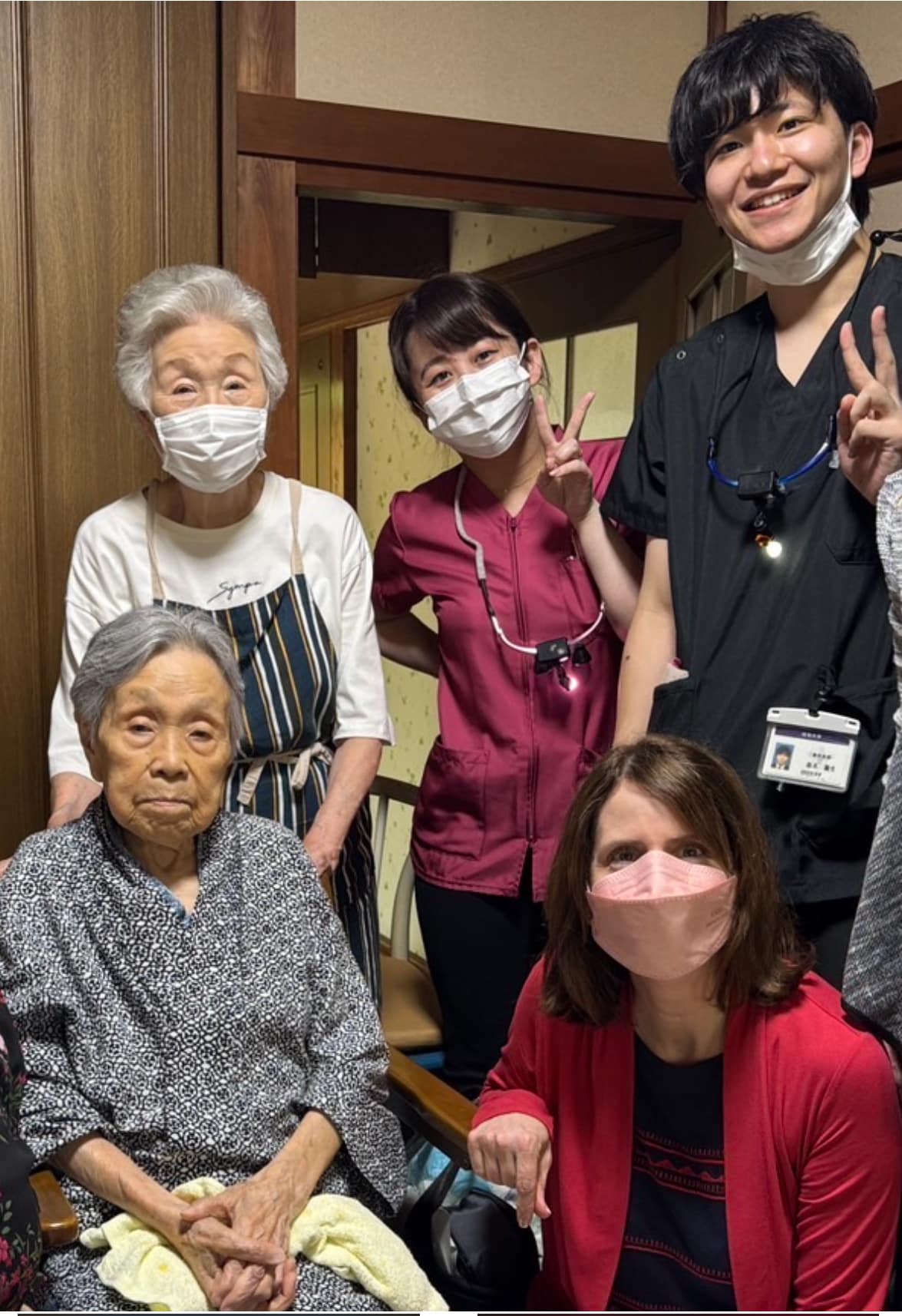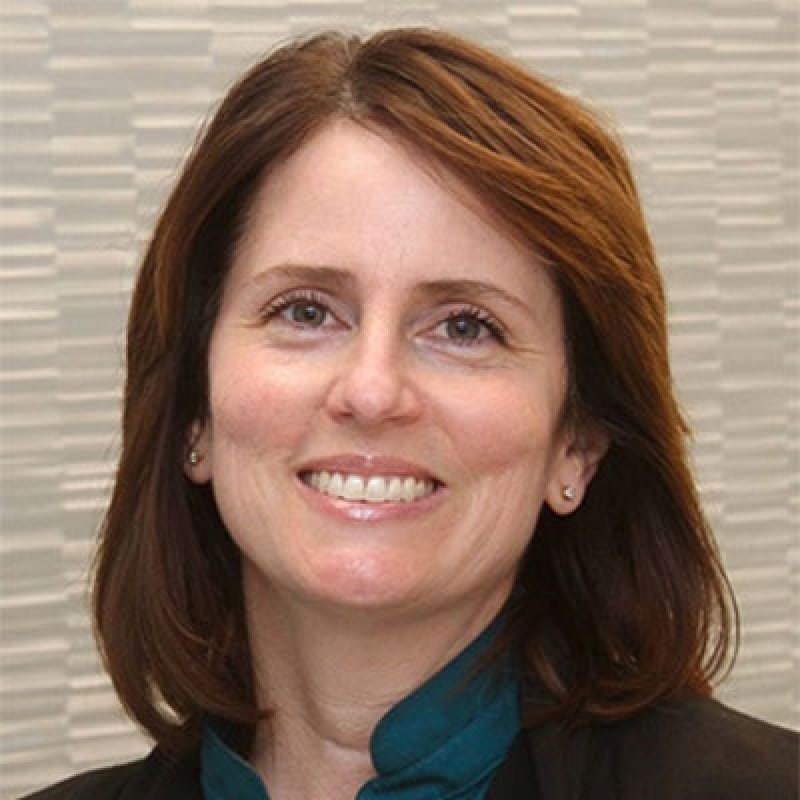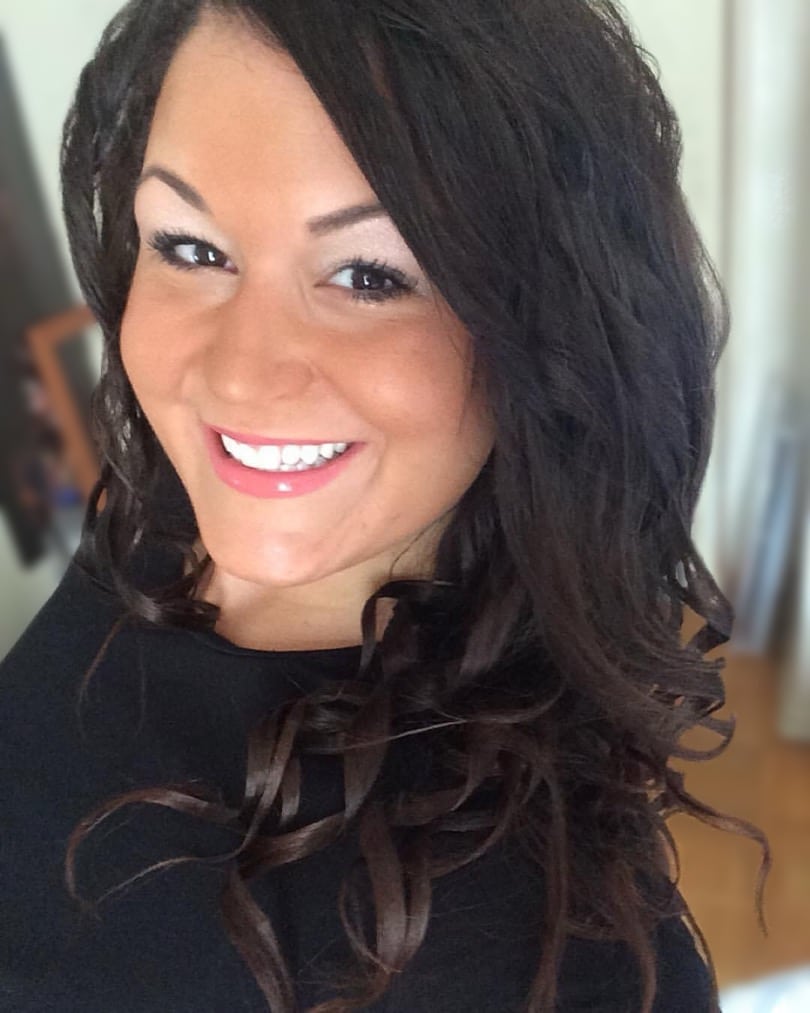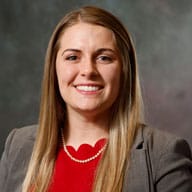Master of Science in Dental Hygiene

June 1, 2026
August 25, 2026
Advance your career in dental hygiene education through this industry leading graduate program.
Ohio State’s online Master of Science in Dental Hygiene program is thoughtfully designed to prepare licensed dental hygienists for advanced roles in education, research, and leadership. The curriculum blends individualized learning experiences with a rigorous core of coursework, providing students with the comprehensive knowledge and hands-on experience needed to teach in dental hygiene programs and influence the future of the profession.
This graduate program is specifically tailored for dental hygienists who already hold a bachelor’s degree. The courses build upon existing clinical expertise while deepening understanding of education methodology, research design and analysis, and evidence-based practices. Students gain theoretical knowledge and practical skills related to laboratory, pre-clinical, and clinical instruction—ensuring they are well-prepared to guide and mentor the next generation of dental hygiene professionals.
A hallmark of this program is the personalized attention students receive from faculty and advisors. From the start, students attend an in-person, on-campus orientation that fosters strong connections with faculty, peers, and university resources. This emphasis on community and support continues throughout the program, offering a highly engaging and collaborative learning environment—even in the online format.
Whether your goal is to teach in an academic setting, contribute to research, or shape the future of dental hygiene through leadership, Ohio State’s online MS in Dental Hygiene provides the foundation and flexibility to help you succeed.
Ohio State’s online Master of Science in Dental Hygiene (MSDH) program stands out as a top choice for dental hygiene professionals seeking to advance their careers through flexible, high-quality graduate education. Designed for licensed dental hygienists, this program delivers the academic rigor and prestige of Ohio State—ranked among the best universities in the nation—right to your fingertips.
Here is why NOW is the time to move your career forward:
✅ One Start Term Per Year – Don’t Wait Another Year
The program only accepts new students for the autumn term, so if you’re considering earning your MSDH, now is the time to apply. Waiting could mean delaying your professional advancement by an entire year.
✅ Competitive Tuition Rates, No Matter Where You Live
Ohio State’s online Master of Science in Dental Hygiene program offers a high-quality education at a competitive cost. Whether you live in Ohio or another state, you’ll pay the same tuition rate—making it easier to plan financially and invest confidently in your future.
✅ Completely Online – Built for Working Professionals
This fully online program is designed with working dental hygienists in mind, allowing you to balance your studies with your professional and personal responsibilities.
✅ Prepare for Leadership, Education, and Research Roles
Whether you want to teach, lead, or conduct research in the dental hygiene field, Ohio State’s MSDH program provides the knowledge and credentials to take your career to the next level.
Don’t miss your chance to join this highly respected program—apply today and start this autumn! With only one admission cycle per year, acting now ensures you stay on track to meet your academic and professional goals without delay.
Ohio State’s online Master of Science in Dental Hygiene (MSDH) program is designed to equip licensed dental hygienists with the advanced knowledge and skills needed to lead, educate, and innovate in the field of dental hygiene.
Through a rigorous and flexible online curriculum, you’ll gain expertise in:
🧠 Dental Hygiene Theory and Practice
Deepen your understanding of the science and philosophy behind dental hygiene care, with an emphasis on evidence-based practice and patient-centered care models.
📊 Research Methods and Evidence-Based Decision Making
Learn how to critically evaluate scientific literature, design research studies, and apply evidence-based approaches to improve patient outcomes and advance the profession.
🎓 Education and Curriculum Development
Prepare to become an educator in academic or clinical settings. You’ll explore teaching strategies, curriculum design, and assessment methods tailored to dental hygiene education.
🏥 Leadership in Healthcare and Public Health
Develop leadership skills to take on influential roles in dental hygiene, whether in clinical practice, academia, advocacy, or public health. Courses focus on health policy, ethics, and interprofessional collaboration.
📈 Professional Development and Career Advancement
The program fosters professional growth with a focus on oral health disparities, program planning and evaluation, and strategies for influencing health outcomes at both community and population levels.
By the end of the program, you’ll be prepared to lead, teach, and conduct research at an advanced level—empowered to shape the future of dental hygiene. All courses are delivered fully online, making it possible to earn your degree from anywhere while continuing to work in the field.
Frequently Asked Questions
As Ohio’s only state-supported dental school, The Ohio State University College of Dentistry has embraced its public purpose of educating exceptionally capable and compassionate dental hygiene and dental professionals, providing care to patients, conducting cutting-edge research, and serving the community.
The Ohio State Online MS in Dental Hygiene includes 38 total semester hours including a thesis and internship. Students matriculate in the autumn semester. Full time students can complete the program between 1-2 years; the part-time program can be complete within 2 years and must be complete within 5 years.
The Ohio State Online Master of Dental Hygiene begins every Autumn with a cohort of students and applications of prospective students will be reviewed and accepted on a rolling basis with a final application deadline of June 1, 2025.
Related Content
Related Content

Expanding smiles across borders
How Ohio State’s MS in Dental Hygiene program brings global oral health learning to life

From clinician to program director: How Ohio State Online shaped Nicole Patel’s career in dental hygiene
See how Ohio State Online supported Nicole Patel’s career advancement through the flexible RDH to BS completion program and the MS in Dental Hygiene program.

Inspiring the Next Gen: A Journey Through the MS in Dental Hygiene Program
Jennifer Barkans, an international student from Canada shares her inspiring journey.
Academic Calendar
The Ohio State Online Master of Science in Dental Hygiene program only accepts new students for the Autumn term every year. Applications will be accepted on a rolling basis and reviewed by our admissions committee. Seats are limited and students are encouraged to complete and submit their applications as early as possible prior to the June 1, 2026 application deadline for the Autumn 2026 term.
Additional Test Score Requirements: Successful licensure as a registered Dental Hygienist in the United States required.
Academic Calendar
The Ohio State Online Master of Science in Dental Hygiene program only accepts new students for the Autumn term every year. Applications will be accepted on a rolling basis and reviewed by our admissions committee. Seats are limited and students are encouraged to complete and submit their applications as early as possible prior to the June 1, 2026 application deadline for the Autumn 2026 term.
Additional Test Score Requirements: Successful licensure as a registered Dental Hygienist in the United States required.
Admission Criteria
- Baccalaureate degree in dental hygiene, or an associate degree from an accredited dental hygiene program and a baccalaureate degree in a related field
- Overall GPA of 3.0 or higher in undergraduate education and a minimum of 3.0 in the dental hygiene major
- A current dental hygiene license
Successful licensure as a registered Dental Hygienist in the United States required. For international students, please reach out to learn more from an Enrollment Advisor about requirements for this program.
English language testing requirements: – 550 Paper-based TOEFL – 79 Internet-based TOEFL (IBT) – 7.0 IELTS
Application Material
The application deadline in June 1. All the following material must be submitted by that date:
A Completed application. Application for admissions to the program must complete an Ohio State Graduate Admission online application.
To complete your application and verify your degree and undergraduate GPA, you must submit transcripts from all educational institutions you have attended.
When applying:
- You may upload scanned copies of official transcripts, diplomas, or degree certificates to the online application system. Note: You do not need to submit transcripts for coursework or degrees earned from The Ohio State University.
- These scans help form a complete application packet, but they do not replace the need for official documents.
What is not accepted:
- Advising reports
- Unofficial transcripts or scans labeled “UNOFFICIAL”
- Documents with a URL across the top
- Transcripts missing the institution’s name, seal, stamp, or GPA
These types of documents will not be used for degree verification or GPA calculation.
Exception: You do not need to submit transcripts for coursework or degrees earned from The Ohio State University.
Proof of an active dental hygiene license.
Two letters of recommendation from persons acquainted with your academic program, scholastic ability or professional performance.
A statement of intent describing your educational and professional goals and objectives. Explain why you are applying to the Master of Science in Dental Hygiene program and how your educational goals and research plans could contribute to our program. (300-700 words)
A summary of relevant work, volunteer or professional experience, date and title of any publications, research experience and any professional speaking engagements.
A list of memberships held in professional associations or honorary societies, indicating offices held or committee service, national or state meetings attended and any professional honors or awards received (include dates).
English proficiency requirement, if you come from a country where the first language is not English, unless you earned a bachelor’s degree or higher in an English-speaking country.
A non-refundable application processing fee of $60 is required.

The Ohio State University participates in the State Authorization Reciprocity Agreements (SARA).
SARA is a national initiative that increases student access to distance education courses and programs while maintaining compliance with state regulations. Institutions participating in SARA can offer educational opportunities in all 49 SARA member states, the District of Columbia, the U.S. Virgin Islands and Puerto Rico without seeking individual approval in each state.
California is not a SARA member state, however, OSU may offer online courses and programs to students located in California under the California Private Post-Secondary Act of 2009.
The Application Process
Once you understand your program’s admission criteria, please note the application deadline. You’ll need a quiet space and a variety of materials for your application. To learn more, please see our Admissions page for the full process. Ready to Apply? Find your application here.
Career Outlook
A Master of Science in Dental Hygiene opens up various career opportunities beyond traditional clinical practice. Graduates can pursue roles in education, research, administration, public health, and industry. Here are some potential career paths and job prospects for someone with a Master of Science in Dental Hygiene:
1. Education:
- Dental Hygiene Educator/Instructor: Teaching dental hygiene students in academic settings, such as colleges, universities, and dental schools. Responsibilities include lecturing, clinical supervision, and curriculum development.
- Program Director: Overseeing dental hygiene programs, including curriculum design, accreditation processes, faculty management, and student recruitment.
2. Research:
- Dental Hygiene Researcher: Conducting research on oral health, dental hygiene practices, preventive care, and patient outcomes. This role may involve working in academic, governmental, or private research settings.
- Clinical Research Coordinator: Managing and coordinating clinical trials related to dental health and hygiene products or interventions.
3. Administration and Management:
- Healthcare Administrator: Managing dental clinics, community health programs, or other healthcare facilities with a focus on oral health services.
- Public Health Program Manager: Leading public health initiatives focused on oral health promotion, disease prevention, and community education.
4. Public Health:
- Public Health Dental Hygienist: Working in public health organizations to promote oral health, develop community outreach programs, and address disparities in access to dental care.
- Health Policy Analyst: Analyzing and developing policies related to oral health, dental hygiene practices, and public health initiatives.
5. Industry:
- Dental Product Developer/Consultant: Working with dental product companies to develop, test, and promote new dental hygiene products. This may include roles in product development, clinical trials, and marketing.
- Corporate Educator/Trainer: Providing education and training for dental professionals on behalf of dental product companies or healthcare organizations.
6. Advocacy and Consulting:
- Oral Health Advocate: Working with non-profit organizations, government agencies, or advocacy groups to promote oral health initiatives and influence public policy.
- Consultant: Offering expertise to dental practices, healthcare organizations, or educational institutions on improving dental hygiene practices, curriculum development, or patient care.
7. Advanced Clinical Practice:
- Specialized Dental Hygienist: While clinical roles are typically associated with undergraduate degrees, those with a master’s may focus on advanced or specialized areas of practice, such as periodontics or geriatric oral health.
8. Writing and Communication:
- Dental Health Writer/Editor: Writing or editing content related to dental health and hygiene for textbooks, professional journals, online platforms, or patient education materials.
- Continuing Education Provider: Developing and delivering continuing education courses for dental hygienists and other dental professionals.
Top Occupations by Median Income
What They Do
Administer oral hygiene care to patients. Assess patient oral hygiene problems or needs and maintain health records. Advise patients on oral health maintenance and disease prevention. May provide advanced care such as providing fluoride treatment or administering topical anesthesia.
Work Activities
Record and review patient medical histories. Feel and visually examine gums for sores and signs of disease. Examine gums, using probes, to locate periodontal recessed gums and signs of gum disease.
Wage Range
- Entry Level: $66,470
- Mid Level: $94,260
- Senior Level: $120,060
Job Outlook
Bright
Related Careers
- Dental Assistants
- Licensed Practical and Licensed Vocational Nurses
- Medical Assistants
- Ophthalmic Medical Technicians
- Surgical Assistants
Job Sectors
- Medicine and Dentistry
- Customer and Personal Service
- Psychology
What They Do
Construct and repair full or partial dentures or dental appliances.
Work Activities
Read prescriptions or specifications and examine models or impressions to determine the design of dental products to be constructed. Test appliances for conformance to specifications and accuracy of occlusion, using articulators and micrometers. Fabricate, alter, or repair dental devices, such as dentures, crowns, bridges, inlays, or appliances for straightening teeth.
Wage Range
- Entry Level: $36,100
- Mid Level: $48,310
- Senior Level: $78,680
Job Outlook
Below Average
Related Careers
- Dental Assistants
- Medical Appliance Technicians
- Medical Equipment Repairers
- Molders, Shapers, and Casters, Except Metal and Plastic
- Ophthalmic Laboratory Technicians
Job Sectors
- Administration and Management
- Design
- English Language
- Medicine and Dentistry
- Production and Processing
What They Do
Provide and manage health education programs that help individuals, families, and their communities maximize and maintain healthy lifestyles. Use data to identify community needs prior to planning, implementing, monitoring, and evaluating programs designed to encourage healthy lifestyles, policies, and environments. May link health systems, health providers, insurers, and patients to address individual and population health needs. May serve as resource to assist individuals, other health professionals, or the community, and may administer fiscal resources for health education programs.
Work Activities
Prepare and distribute health education materials, such as reports, bulletins, and visual aids, to address smoking, vaccines, and other public health concerns. Develop and maintain cooperative working relationships with agencies and organizations interested in public health care. Maintain databases, mailing lists, telephone networks, and other information to facilitate the functioning of health education programs.
Wage Range
- Entry Level: $42,210
- Mid Level: $63,000
- Senior Level: $112,900
Job Outlook
Bright
Related Careers
- Community Health Workers
- Health Informatics Specialists
- Healthcare Social Workers
- Nursing Instructors and Teachers, Postsecondary
- Rehabilitation Counselors
Job Sectors
- Customer and Personal Service
- Education and Training
- English Language
- Administrative
- Psychology
What They Do
Plan, direct, or coordinate clinical research projects. Direct the activities of workers engaged in clinical research projects to ensure compliance with protocols and overall clinical objectives. May evaluate and analyze clinical data.
Work Activities
Schedule subjects for appointments, procedures, or inpatient stays as required by study protocols. Perform specific protocol procedures such as interviewing subjects, taking vital signs, and performing electrocardiograms. Assess eligibility of potential subjects through methods such as screening interviews, reviews of medical records, or discussions with physicians and nurses.
Wage Range
- Entry Level: $79,830
- Mid Level: $161,180
- Senior Level:
Job Outlook
Bright
Related Careers
- Clinical Data Managers
- Clinical Nurse Specialists
- Health Informatics Specialists
- Health Specialties Teachers, Postsecondary
- Social Science Research Assistants
Job Sectors
- Customer and Personal Service
- English Language
- Administrative
- Medicine and Dentistry
What They Do
Perform routine medical laboratory tests for the diagnosis, treatment, and prevention of disease. May work under the supervision of a medical technologist.
Work Activities
Conduct chemical analyses of body fluids, such as blood or urine, using microscope or automatic analyzer to detect abnormalities or diseases and enter findings into computer. Analyze the results of tests or experiments to ensure conformity to specifications, using special mechanical or electrical devices. Set up, maintain, calibrate, clean, and test sterility of medical laboratory equipment.
Wage Range
- Entry Level: $38,020
- Mid Level: $61,890
- Senior Level: $97,990
Job Outlook
Average
Related Careers
- Cardiovascular Technologists and Technicians
- Cytogenetic Technologists
- Histology Technicians
- Histotechnologists
- Medical and Clinical Laboratory Technologists
Job Sectors
- Biology
- Chemistry
- English Language
- Mathematics
- Customer and Personal Service
What They Do
Perform complex medical laboratory tests for diagnosis, treatment, and prevention of disease. May train or supervise staff.
Work Activities
Conduct chemical analysis of body fluids, including blood, urine, or spinal fluid, to determine presence of normal or abnormal components. Analyze laboratory findings to check the accuracy of the results. Operate, calibrate, or maintain equipment used in quantitative or qualitative analysis, such as spectrophotometers, calorimeters, flame photometers, or computer-controlled analyzers.
Wage Range
- Entry Level: $38,020
- Mid Level: $61,890
- Senior Level: $97,990
Job Outlook
Average
Related Careers
- Cytogenetic Technologists
- Cytotechnologists
- Histology Technicians
- Histotechnologists
- Medical and Clinical Laboratory Technicians
Job Sectors
- Biology
- Medicine and Dentistry
- Customer and Personal Service
- Chemistry
- English Language
National occupational information in Ohio State Online’s Career Outlook tool is sourced from O*NET Online and the U.S. Bureau of Labor Statistics (BLS). The median annual wage displayed to the right of each occupational title above is based on the BLS Employment Projections program. Outlook and percent change indicate projected growth or decline over the next 10 years.
Curriculum
The MS program consists of courses in education, research and leadership, and includes a thesis and internship. In total, this MSDH program requires 38 semester hours and typically takes four semesters (approximately 2 years) to complete.
Campus Requirements: Courses are 100% online however, students are required to attend one on-campus, in-person orientation prior to the start of the program typically near the end of July or early August to meet the cohort and faculty, as well as connect with university and college resources. If coming to campus to connect with the new cohort of students presents an exceptional hardship, exceptions can be made.
The study of theory, principles and research related to the faculty role in active teaching and learning, critical thinking, and development of course alignment in dental hygiene education.
Examines current issues which affect the overall dental profession with a strong focus on dental hygiene issues and the delivery of dental health care. It explores current and innovative strategies to make changes in dental hygiene to improve oral and overall health care.
Designed to present conception and technical problems in the development and implementation of clinical, behavioral and basic science research projects related to dentistry.
Designed to study the concept of policy as it relates to dental hygiene educational institutions and their governance and practices while providing knowledge and skills in basic management and administration.
Designed to provide a conceptual foundation of statistics related to basic, clinical and behavioral dental science.
Understanding Online Course Types
As you research the right online program for you, you likely will come across the terms “asynchronous” and “synchronous.” Learn what these terms mean and how they’re important to consider when understanding how a program will fit into your life.
Learn More

Program Faculty
The Ohio State University College of Dentistry is proud to offer the only dental school-based dental hygiene program in Ohio.

Danielle Rulli, MS, DHSc
Danielle Rulli, RDH, MS, DHSc, is an Associate Professor in the College of Dentistry and Director of the Master’s in Dental Hygiene program. She earned her degrees from the University of Vermont, University of North Carolina, and Nova Southeastern University. Dr. Rulli’s research focuses on interprofessional education and non-surgical periodontal therapies. She contributed to Oral Health in America: Advances and Challenges and serves as a subject matter expert for the National Council on Mental Wellbeing. She has published over 40 peer-reviewed papers and is recognized for her leadership in dental education, including receiving the ADEA Chair of the Board Citation and the University of Michigan’s Provost’s Teaching Innovation Prize. Dr. Rulli currently serves on the ADEA Task Force on the Future of Oral Health Education and speaks globally on dental education and therapies.
Irina A. Novopoltseva MS, BSAs, RDH
Assistant Professor – Clinical
Rachel Kearney, BSDH, MS
Associate Professor
Jamie Bishop, BSDH, MDH
Assistant Professor
Testimonials
Don’t just take our word for it. Hear what Master of Science in Dental Hygiene alumni are saying about Ohio State Online’s MSDH program.
Tuition Fee Overview
Investing in your future with a higher education degree is one of the best investments you can make for your future success. At Ohio State, we know understanding your program’s cost is an important part of your decision-making process. Below are the tuition fees you can expecct with your program. Actual costs may vary. Estimates are based on the expenses typical of an Ohio State Online student, who would take 6 credit hours each semester as a part-time undergraduate student (or 8 credit hours for graduate programs), or 12 credit hours (for undergraduate programs) each semester as a full-time student. Please note that the summer semester instructional and general fees are 75% of the cost of autumn and spring fees, and this will decrease your total cost for the program.
The Master of Science in Dental Hygiene requires 38 credit hours. The tuition calculator reflects that total. If you have transfer credits that are reviewed and approved, your total cost may vary.
Tuition fees are subject to change. The table above serves as a guide and not an official bursar’s bill. Full-Time costs are total tuition costs per semester.
Financial Aid Resource
Financial Aid Resource
Related Articles
Related Articles

How to ask your employer for tuition reimbursement
How to Pay for Your Online Program

Tips for Online Learning from Ohio State Students and Faculty
Get Started
Connect with a knowledgeable Enrollment Advisor who can help answer your questions and explain different aspects of the more than 80 online degrees and certificates offered at Ohio State. They are here to help you on your education journey.








